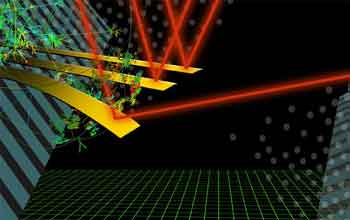|

Media Advisory 04-19
Briefing, Discussion and Exhibits Explore the New Technology of Sensors

June 4, 2004
NOTICE!
The Sensors events scheduled for Thursday, June 10, 2004, have been postponed due to the ceremonies honoring the late President Ronald Reagan. The events will be rescheduled later this year and we will let you know as soon as a new date has been confirmed. We regret any inconvenience this has caused.
Arlington, VA —- From tiny robo-spies designed to prowl unseen through hostile territory, to wireless networks of chemical sniffers monitoring pollution in the wilderness, a new wave of ultra-high-tech sensors has begun to link the cyberspace of bits and bytes with the analog world we actually live in. And in the process, these devices are transforming the way we understand and manage that world.
On June 10, 2004, interested reporters are invited to “Sensors: Buildings, Battlefields, and Beyond”: a media briefing that will explore the implications and potential of the new sensor technology—complete with a hands-on, make-your-own-sensor demonstration. The briefing will be hosted by the National Science Foundation (NSF), in collaboration with the American Chemical Society, ASM International, and the National Academies, and will run from 2:30 p.m. to 3:30 p.m. in room 110 of the NSF building, 4201 Wilson Blvd., Arlington, Va.
That same evening, from 6:30 to 9:00 p.m. on June 10, the hosts invite reporters and members of the general public to a reception, an informal discussion, and exhibits on sensor technology at the Keck Center of the National Academies, 500 Fifth St. NW, Washington, DC.
|
What:
|
"Sensors: Buildings, Battlefields, and Beyond" — Afternoon media briefing & Evening reception
|
|
Media Briefing
|
|
Who:
|
Curt Suplee, NSF - Moderator
Dr. Amy Duwel, MIT Draper Laboratories
Dr. Nate Lewis, Professor of Chemistry, Caltech
Dr. Kathleen Hickman, Defense Threat Reduction Agency
|
|
When:
|
Thursday, June 10, 2004
2:30 - 3:30 p.m.
|
|
Where:
|
National Science Foundation
4201 Wilson Blvd., Room 110
Arlington, VA 22230
(Ballston Metro stop)
Media visitors can go directly to room 110; there is no need to check in at the security desk.
Mult box provided for broadcast journalists
|
|
Reception, Informal Discussion, and Exhibits
|
|
Who:
|
Curt Suplee, NSF - Moderator
Dr. Amy Duwel, MIT Draper Laboratories
Dr. Kathleen Hickman, Defense Threat Reduction Agency
Exhibitors:
1. Next Dimension Technologies (Build your own sensors!)
2. Boston University (Sensors in emergency medical care)
3. Sionex Corporation (Miniaturized MEMS spectrometer chips)
4. Purdue University (Miniature mass spectrometer)
|
|
When:
|
Thursday, June 10, 2004
6:30 – 9:00 p.m.
|
|
Where:
|
The Keck Center of the National Academies
500 Fifth St. NW
Washington, DC 20001
|
-NSF-

Media Contacts
M. Mitchell Waldrop, NSF (703) 292-7752 mwaldrop@nsf.gov

The National Science Foundation (NSF) is an independent federal agency that
supports fundamental research and education across all fields of science and
engineering, with an annual budget of $6.06 billion. NSF funds reach all 50
states through grants to over 1,900 universities and institutions. Each year,
NSF receives about 45,000 competitive requests for funding, and makes over
11,500 new funding awards. NSF also awards over $400 million in
professional and service contracts yearly.
 Get News Updates by Email Get News Updates by Email
Useful NSF Web Sites:
NSF Home Page: http://www.nsf.gov
NSF News: http://www.nsf.gov/news/
For the News Media: http://www.nsf.gov/news/newsroom.jsp
Science and Engineering Statistics: http://www.nsf.gov/statistics/
Awards Searches: http://www.nsf.gov/awardsearch/
| 


